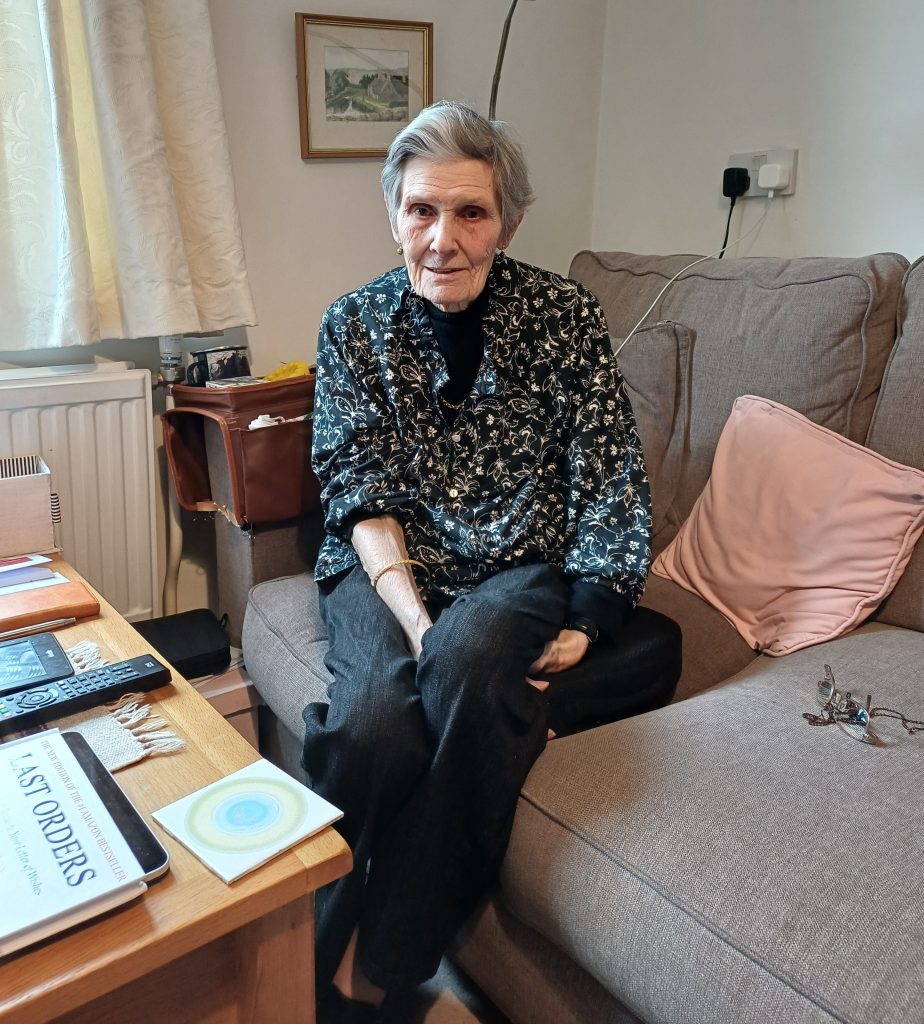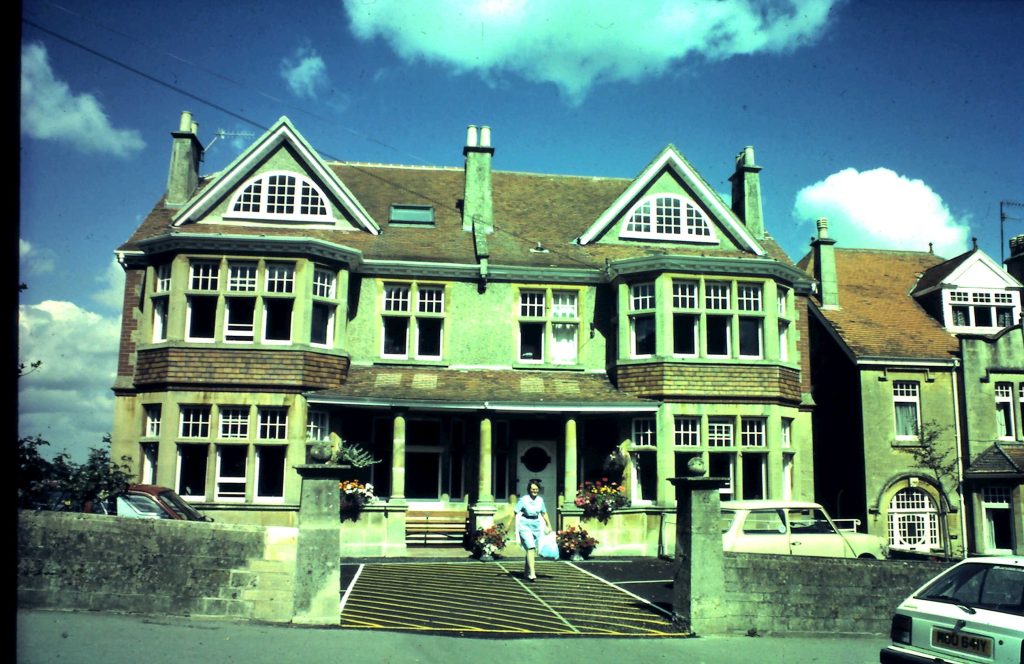The founding of Dorothy House – Dr Bridget Wakefield’s story
Ahead of the twentieth anniversary of Prue Dufour’s death (21st August), we were lucky enough to speak to Dr Bridget Wakefield, who was on the original committee at the founding of Dorothy House.
At 93 years old, Bridget tells us about her career, how she came to work in palliative care at the inception of the hospice movement, the creation of Dorothy House, and her relationship with Prue herself.

How it all began…
“Working in medicine is in my blood. My grandfather was a GP, as was my father, and many of my family members also work in medicine. My father was desperate to have a son so he could follow in his, and his own father’s footsteps, and train at St Mary’s medical school. By amazing good luck, I was able to tell him ‘I’ll go!’ as it was the very first year that women were allowed to train there. Most of the students were older ex-servicemen who had served in WWII, a few boys and a handful of girls like me. It was very competitive as many women wanted to train in medicine, so I was very lucky to go to St Mary’s. It was very different back then; the female medical students were separated from the men, so we had different times at the swimming pool and couldn’t use the common room together. I started medical school the year the NHS was founded, in September 1948, so everything was experimental.
I met my husband at medical school; he was one of the boys in my year. He was the shyest, quietest and loveliest boy; he was my best friend. We got engaged when we were penniless students, and we married quickly because it was the first year that newly qualified doctors were required to spend a year living at a hospital, completing six months in surgery and six months in medicine. We worried that with him working in London and myself in Bath at St Martin’s (it was difficult to get jobs then because new ones had to be created in hospitals for this new programme) that we would drift apart, so we got married. We didn’t see each other for the first six months and we only had four telephone calls in all that time. You had to make an appointment for a call in those days, and the other person had to be waiting at the other end!
Moving to Bath
After my residency in Bath, I found a job in Slough as a GP and my husband, who was undertaking his compulsory military service in Aldershot, could see me there. That was when we started our family, with the first of our five children born. I then took a job as a GP in a lovely Gloucestershire village while my husband stayed in London to continue his career as a neurologist. I had a wonderful time there; my mother in law was able to help with the children and we no longer had to live in a crowded apartment. The village must have found it very strange; a woman doctor with children and an enormous 1930s Jaguar! Over the next few years, my husband would come down every weekend to stay with us in the cottage we bought there. Eventually, my husband moved to Bath as Neurologist at the RUH and we joined him there. I started a GP practice on Queen’s Parade.
Meeting Prue
Around this time, Prue sent me her letter about founding Dorothy House and joining the committee. Prue was a force to be reckoned with. Nobody but Prue could have got Dorothy House off the ground. She was an incredible person; sometimes difficult, but her heart was in the right place. Someone close to her had died an awful death and she had been very impressed with St. Christopher’s in London. She called the hospice Dorothy House, meaning a ‘gift from God’. She was prepared to give her whole life to doing this. She told GPs that she wanted to be someone they could call on if they had a terminal patient. When I had very poorly patients I asked Prue to see them and she nursed them and always looked after their families too.
Bridget’s career in terminal care and the founding of Dorothy House
My husband became secretary of the Clinical Society, inviting Cicely Saunders to speak to the society and stay with us overnight. I then spent a week at St. Christopher’s and a week at Oxford, learning as much as I could about terminal care. There was an opportunity to apply for funding to carry out research and I wanted to research terminal care wards. Prue helped and advised me with my application for the fellowship, in which I was given funding for a year in order to write how to set up a terminal care unit. That was great because I had the chance to see the newest ones being set up. I attended a conference on terminal care in Sheffield and then in Washington in the USA where they were just beginning to think about hospice care. I also spent a week at St Joseph’s in London – the oldest hospice in England. The culmination of the fellowship was that I had to write a paper on all my research and submit it to the College of General Practitioners.

At this time, Prue said she would give up her home and turn it into a nursing home, though it only had a few beds. There were numerous problems to overcome; many neighbours complained about ambulances and hearses at all hours. It wasn’t all straightforward but she really gave everything to the founding of Dorothy House. At this time, my sister worked for her as a nurse at the Bloomfield Road building. Several of my patients left Prue a legacy so things were able to grow. Then we had a Treasurer join the committee. You can see it gradually built up. However, when we had committee meetings, if Prue didn’t approve of ideas they wouldn’t be used. She knew exactly what she wanted.
Prue arranged for me to talk to nurses at a conference in Wells. I didn’t want to do it at all, but she insisted; she said “We’ve supported you so you have to do it.” I don’t think I’ve ever been so frightened as when I had to do public speaking! The Bishop of Bath and Wells sat in the front row! But I did it, I managed. After that, I received a letter from the College of Nursing saying they would like to put the lecture in their magazine.
A lasting legacy
I then decided that my life was just too busy and my children needed me. I said to Prue that now things were doing well she didn’t need me anymore. There were many ups and downs, stresses, the meetings could be difficult, very often the rest of us weren’t quite as committed as Prue was. No one could have done it but Prue; she devoted her life to it and deserves full credit for it.
I didn’t feel there was much more I could do, but I remained very interested in terminal care, helping people to die a little easier. My father said ‘Death is hiding behind a tree, he thinks I cannot see him.’
I recently visited the new building at Winsley and I think Prue would be over the moon to see what you’re doing. I believe it’s more than she could ever have hoped for.”
- Share this page:
- https://www.dorothyhouse.org.uk/?p=129233